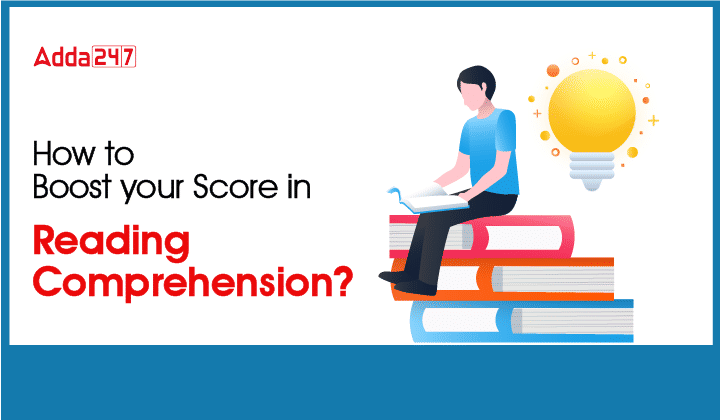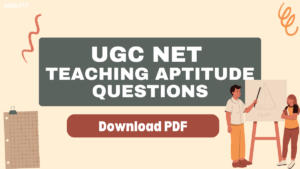Table of Contents
Reading comprehension is a crucial component of many exams, starting from school tests to higher-level competitive exams. In the UGC Exam, this section has varied weightage but remains significant. Each question in reading comprehension carries 1 mark and there is no negative marking for incorrect answers. Therefore, it’s an essential area to focus on, as it can greatly impact your overall score. In this article, we will discuss strategies in detail to boost scores in reading comprehension.
What is Reading Comprehension?
Reading Comprehension is simply an act of reading a paragraph and grasping its meaning simultaneously. This is an active part of reading and takes place before, during and after you read something. There are two components of reading comprehension: text comprehension and vocabulary knowledge. Reading comprehension tests our understanding power, grasping power, level of vocabulary, and making decision power.
Reading comprehension is one of the most common topics in every competitive exam. Candidates will have to answer the comprehension passages in the exam. Getting good marks in comprehension will depend upon your analytical ability as it’s one of the tricky topics of the UGC NET exam.
Tips to boost the score in Reading Comprehension
Most of the students want to score high in exams, for this reading comprehension is the best topic to score full marks in any exam. It means reading comprehension offers great rewards on the other hand it is very time and energy-consuming. Most of the time you may come across a passage you never read, in this situation there are some ways you should follow to get full marks in your RC section. Here are the following tips:
- Build Your Background Knowledge: Background knowledge refers to the information you already know about a subject. The more background knowledge you have, the easier it will be to understand and remember new information. To build your background knowledge, read widely and make connections between different subjects. Watch documentaries, listen to podcasts, and attend lectures or workshops to learn about new topics. Make a habit of reading newspapers and magazines to stay informed about current events.
- Practice Time Management: Time management is crucial for success in any reading comprehension test or assignment. Practice setting a timer and completing practice passages within the allotted time. Develop a strategy for reading through the passage, answering questions, and checking your work within the time limit. Be mindful of how much time you spend on each question, and skip difficult questions if necessary to ensure you have enough time to answer all questions.
- Focus on Active Reading: When you read, try to actively engage with the material. This means taking notes, highlighting important points, and summarizing what you have read. Use a dictionary to look up unfamiliar words, and try to determine their meaning based on the context of the sentence. Make flashcards or use an online tool to practice memorizing definitions, synonyms, and antonyms.
- Use Context Clues: Context clues are hints or clues within a sentence or passage that can help you determine the meaning of an unfamiliar word. Look for surrounding words or phrases that provide information about the meaning of the word. Pay attention to prefixes, suffixes, and root words, as these can provide clues about the meaning of a word.
- Practice with sample papers: Take practice tests or sample papers to get a feel for the types of questions you can expect on the NET exam. This will help you become more familiar with the format and build your confidence.
- Analyze your Mistakes: If you make mistakes on practice tests or sample papers, take the time to analyze them. Figure out where you went wrong and what you can do to improve.
- Take Breaks: Taking regular breaks will help you stay focused and avoid burnout. Make sure to take short breaks every hour or so to stretch, move around, and recharge.
- Use a Pointer & Avoid Re-reading: This is one of the most common mistakes made by candidates. If you are reading a passage and escape a word, it will lead to breaking down the momentum of reading and that means you will have to re-read that line. You can waste 2-3 minutes in this kind of situation. To avoid this, you can use a pen or pencil or finger as a pointer.
Boosting Score in Reading Comprehension
To enhance your Reading Comprehension score, focus on active reading by asking questions and anticipating content before diving in. Skim the passage initially to grasp its structure and main ideas. Identify the central theme and underline key details while reading, and annotate the text by summarizing paragraphs and jotting down questions.
Develop your vocabulary and practice regularly with various texts. Simulate timed test conditions for speed and accuracy. Review and learn from your mistakes, consider joining study groups, and use practice resources. Find a distraction-free study environment, take short breaks for complex passages, and stay calm under test pressure. Lastly, maintain your overall well-being for optimal cognitive function.
Hence, boosting your score in reading comprehension requires practice and dedication. By practising active reading, building your vocabulary and background knowledge, using context clues, and practising time management, you can improve your reading comprehension skills and achieve success in your academic and professional pursuits.
Download How to Boost Your Score in Reading Comprehension PDF
Below is the direct download link for How to Boost Your Score in Reading Comprehension Study Notes PDF for UGC NET Exams. Candidates can access and download the UGC NET Study Notes PDF from the provided link.
Download How to boost your Score in Reading Comprehension Notes PDF



 UGC NET Commerce Syllabus 2025 PDF Downl...
UGC NET Commerce Syllabus 2025 PDF Downl...
 UGC NET Teaching Aptitude Questions Answ...
UGC NET Teaching Aptitude Questions Answ...
 UGC NET Philosophy Syllabus 2025 PDF Dow...
UGC NET Philosophy Syllabus 2025 PDF Dow...




